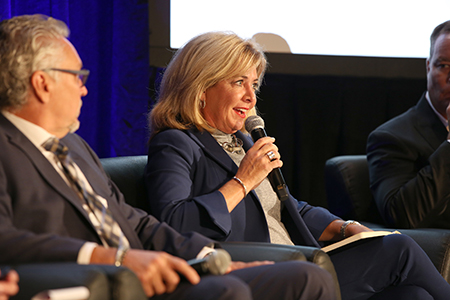Collaboration as a concept is as old as time—but in the real estate industry, it represents a newer challenge: teams.
“Brokers, in my opinion, have three choices: embrace the concept; look at it as a necessary evil; or have a ‘no flipping way’ attitude,” said Cleve Gaddis, leader of Gaddis Partners, RE/MAX Center, and moderator of “Agent Teams: How to Manage, Maximize and Mitigate Risk,” a panel session at RISMedia’s recent 2017 Real Estate CEO Exchange.
“Teams are just a fact,” Gaddis told attendees of the exclusive event, which took place at the Harvard Club of New York City. “You either love ’em or hate ’em.”
As a panel, Gaddis and several pro-team leaders offered up lessons learned, perspective and tried-and-true tips.
The appeal, the panel agreed, is the distinct roles within the team—the whole, really, is greater than the sum of its parts.

“We recognized that there really is a division of a labor in the real estate transaction,” said Peter Hunt, CEO, chairman and president of Hunt Real Estate Corp. and Hunt Real Estate ERA—whose company, incidentally, is trademarked “the most team-friendly real estate company in the U.S.”
“All the while we’ve been trying to build these perfect little real estate beings in our training process, when, in reality, people are good at things and not good at others,” Hunt said. ” helped bring people closer together, recognize what they’re good and not good at, and contribute to what we’re all about, which is the productivity of our agents.”
“Stop trying to be good in areas where you’re weak,” said Rick Cunningham, investor and owner with Keller Williams Franchises. “Excel in areas where you’re strong, and then we’ll find the right people with the characteristics to support you.”
Embracing teams came by way of trial-and-error for Lynn Reecer, CEO and managing broker of Reecer Properties.

“I very much believe in a quality model versus quantity,” said Reecer. “It was an experiment for a while. My business partner was from the old traditional model—he wanted to bring in anyone who wanted to be an agent for us, whereas I was trying to build a team. It was very obvious which model worked best for our business philosophy and our market.”
Nate Martinez, co-owner of RE/MAX Professionals, has been on board with teams for 30 years—and, in fact, still oversees a sales team today. All that time at the helm, however, hasn’t been without missteps.
“When a team grows big, one thing that also grows very fast is ego—and ego means they’re going to leave,” said Martinez, who once lost four teams in six months. “You need to get to know your team leaders very well, and be transparent.”
Banishing the Frankenstein effect—when the monster’s got one foot out the door—comes down to organization, the panel shared.
“The biggest risk in a team structure is blurring the line between independent contractor and employee,” Cunningham said. “We make it a requirement of our leadership that if you’re going to hire an assistant or a buyer’s agent, you have to go through a training process. There’s too much risk for us at the brokerage level. You have to have a standard.”
“We had to address the issue of what these people really are in terms of their legal status,” said Hunt. ” if they’re unlicensed and functioning in our facilities, they’re going to be an employee. If they’re required to show up for work, they’re an employee. They’re on our payroll, and then we bill back the team leader 100 percent of the costs involved with that employee. Some people try to build hybrids—’Can I split with someone else?’—it gets tricky. We couldn’t have chickeducks—we had to have chickens and ducks clearly defined.”
“The broker should be giving the training and making sure that they’re getting that information,” Martinez said. “Once they start getting it from somewhere else, it’s real easy for them to move on.”
The intangibles are significant, too.
“Don’t underestimate culture—culture is the thing that keeps people, not just compensation,” said Cunningham. “They want to be around other people, and culture is the glue that keeps them together.”
“Our company is two-thirds millennials that are buying homes because they’re making such a good living,” Reecer said. “We couldn’t have hired them if we couldn’t give them a job that was more stable. They had to go on a 100 percent commission. There’s no way I would have these talented millennials that I have . We have to shoulder more of the risk, but the benefits are that you have more control and more accountability.”
“No.1 is being willing to listen to them, and not descend upon them a bunch of edicts,” Hunt said. “Second was to be responsive to what they had to say; in other words, instead of waiting for them with their list of demands and questions and how much more money they needed from me, go out and listen to what they have to say. That is the only way, I think, we can bring value to them.
“The key thing is not to get over-bureaucratized—to be responsive, to show that the organization is there to serve them.”
Stay tuned to RISMedia for continuing coverage of this year’s CEO Exchange sessions:
- The State of Real Estate: ‘The Good, the Bad and the Ugly’
- Brokers Get Real About Standards, Succession Planning and Zillow
- Ushering in a Fresh Perspective: John Peyton and Nick Bailey Ready to ‘Blow the Dust off; Iconic Brand
- Photo Recap: RISMedia’s 2017 Real Estate CEO Exchange
- Innovation, Not Irrelevancy: 3 Strategies to Sustain
- Big Data, Big Opportunities: How Predictive Analytics Is Changing the Business of Real Estate
- Are You Prepared to Handle the Top 3 Risks to Your Brokerage? (Do You Even Know What They Are?)
- Tackling Disruption From the Inside Out
- Know Your Model, Work It Well
Suzanne De Vita is RISMedia’s online news editor. Email her your real estate news ideas at sdevita@rismedia.com.
For the latest real estate news and trends, bookmark RISMedia.com.











